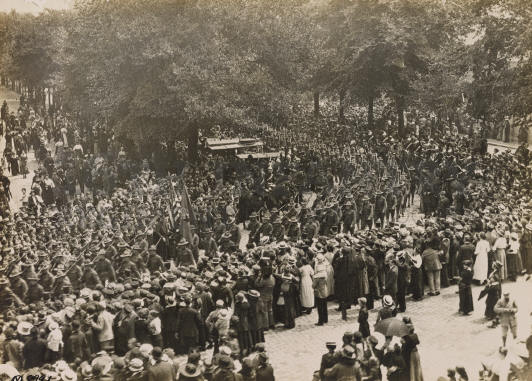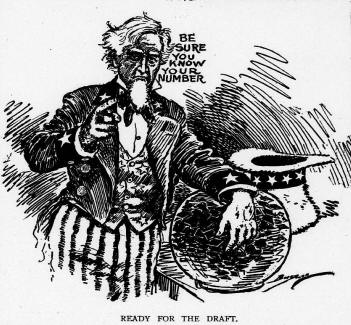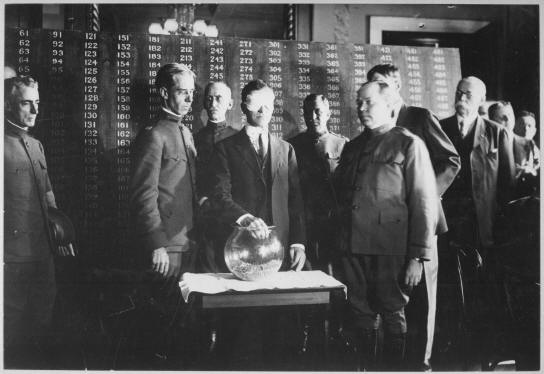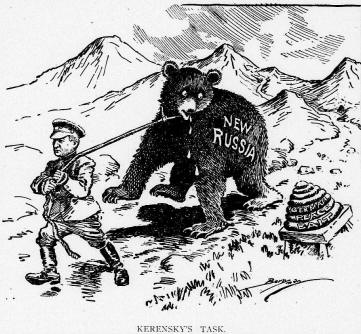July 1917
"The first number is 258"
July 6
A battalion of American troops arrived in Paris on Wednesday to parade on July 4. The Americans were greeted by wildly enthusiastic crowds, which packed the streets through which they marched.

Headed by their own band, the soldiers, carrying rifles and field packs, were surrounded by crowds waving American and French flags. As the troops paraded through the streets, French girls pinned bouquets and American flags on the soldiers’ breast. Flowers were strewn along the route. The band played Yankee Doodle Dandy,
Dixie, Marching Through Georgia, and other American tunes. French soldiers on leave grasped the hands of Americans and marched behind them.
Several times, girls slipped through the police line and kissed the soldiers, to their great embarrassment. Now and then an American voice would be heard calling out "hello boys, welcome to Paris." When the regimental colors were carried past, the men bared their heads. The Americans were greatly surprised to see the number of
children kneel in the streets as the flag was carried by. They were orphans from an institution in the neighborhood.
Meanwhile, on the Eastern Front, renewed activity of the Germans, indicated in the reports from the front in the last few days, is a result of a revival of the Russian fighting spirit and the conviction that a separate peace is impossible.
The Germans, who almost completely laid bare her battlefront, are now feverishly fortifying their trenches and are creating a new defensive line twenty miles behind the first, in preparation for a retreat. Fraternization has entirely ceased and Russian soldiers are immediately firing upon Germans. The Germans have been
obligated to return to their former systems of propaganda, dropping from airplanes the pamphlets containing the abuses of Russia and her allies.
Russia's armies have not lost their old striking power as a result of prolonged inactivity. This is evidenced by a new Russian offensive along the eighteen-mile front. A stroke of such force had hardly been expected from the Russians, considering the disorganization of the Army following the revolution. The surprise of the
initial announcement was that the Russians had affected reorganization and had been able to resume the offensive in this brief time since the great upheaval.
There remains the question of whether the drive could be kept up with sufficient force to reap the full advantage of the victory. While the question does not yet seem to have been definitively decided, the indications today are admittedly encouraging.
The Russian artillery is plentifully supplied with ammunition for the important work it has at hand. The supply department was the weakest of any during the old regime, causing many of the breakdowns from which the fighting forces were not responsible. The deficiency in this respect now seems to have been remedied.
Meanwhile, troubles of all sorts continue to vex the people and public officials of the German Empire. Disappointment over the failure of German efforts to lure Russia into making a separate peace, coupled with the food situation, are the chief troubles, but now other disappointments and sacrifices are in store for the people
- all because of the increasing strain on Germany's ammunition production.
The production of ammunition is being whipped to the limits of human possibility, and in order to meet the demand, the Imperial Sugar Office has announced that for the indeterminate time no more saccharine will be available for distribution. The basic raw material of saccharine is urgently needed for the manufacturing of
ammunition. The production of sugar long since has been diverted from the people’s stomachs to ammunition plants, and the nonproduction of saccharine means that the last vestige of sweetness may vanish from life in Germany.
If that was not enough, a stern warning has been issued to the public to cut out all travel that is not absolutely imperative, such as vacations. This step is taken in order to give the railroads the greatest possible time for the transport of troops and ammunition.
Greater Berlin has been complaining again of the meat supply this week. It is insufficient to give all the people their prescribed ration, and it is intimated that the ration will be reduced even further. The public is told that the coal troubles are much worse in France and England, but unless heaven sends Germany a mild
winter they shall have to endure many hardships, and it is everybody's duty to go easy with coal.
July 13
 President Wilson called into the Federal service all the National Guard organizations of the various states, the final step preliminary to the execution of the selective draft for the first American Army. Under the proclamation by the President, issued
Monday night, the guard organizations are discharged from the state service, thus escaping the constitutional provisions prohibiting the calling of the militia of the states for service overseas outside the boundaries of the country.
President Wilson called into the Federal service all the National Guard organizations of the various states, the final step preliminary to the execution of the selective draft for the first American Army. Under the proclamation by the President, issued
Monday night, the guard organizations are discharged from the state service, thus escaping the constitutional provisions prohibiting the calling of the militia of the states for service overseas outside the boundaries of the country.
The next step in the process of raising the National Army will be the issuance of the proclamation fixing the date for calling to the colors between 650,000 and one million men who registered June 5, and then will come the selective draft itself. Thus far, no official statement has been made in regard to the date on which the
selective draft will be held.
Meanwhile, in France, American troops today entered the final steps of the mobilization that will prepare them to leave within a few days for permanent training camp somewhere behind the firing line.
The majority of the soldiers have spent the time in a vigorous grind of eight hours each day. French officers who have seen service at the front took part in the exercises in order to give the benefit of their experience to the American soldiers. The drills included a daily plunge in the sea. The drill ground is not only ideal
for the purpose, but has the advantage of being at a distance so that the men get a daily hike of five miles.
None of the soldiers know just where they will be sent, but all are enthusiastic at the prospect of getting to the scene of action. Their spirits are fine and their health is the best.
Meanwhile, on the Eastern Front, new and powerful blows are being struck by the Russians in Galicia. Apparently the Russians have broken the German line and Russian cavalry is pursuing the retreating enemy. Halicz, the strategic gateway to Lemberg, has been confirmed captured.
The Russian offensive movement has resulted in a deep wedge being driven into the Austrian and German lines southeast of Lemberg. It took the throwing in of a strong German reserve and the launching of heavy counterattacks to slow up the rush of the Russians. The strategic position in the sector is now clearly in favor of the
Russians.
In the capture of Halicz the Russian Revolutionary Army, so discredited during the last few months, has reached, in a single move, the objective it fought for so stubbornly, but without success last summer, in a long and arduous campaign.
In England, about twenty enemy airplanes bombarded London on Saturday. For about a quarter of an hour the raiders dropped a steady rain of bombs. Damage was done in the heart of London by the raid, which was one of the greatest, if not, the greatest ever attempted by the Germans over the metropolis.
The raid occurred around 9:30 in the morning. Thousands of persons crowded the streets, many of them women and children. The police and soldiers had difficulty in holding back the people. Many people were seen at the windows. Anti-aircraft guns throughout the city and British airplanes immediately engaged the hostile craft and
for a time the sound of exploding bombs and the vicious reply of guns was deafening.
The sun was shining brightly, but the sky was overcast with a haze so favorable to the raiders. Notwithstanding the haze, however, the Germans were visible plainly to the people in the streets. Few persons realized that a raid was in progress until the sound of the bombs was heard. All totaled, 37 persons were killed in the
raid and 141 injured.
The Finnish Diet yesterday passed the second reading of a bill establishing Finnish independence from Russia. The bill proclaims that Russia has lost all authority in Finland. All the prerogatives of the Grand Duke of Finland, which the Finnish Provisional government claims passed automatically to it, belong to Finland.
Specifically, the Diet assumes the Grand Duke's rights to put laws into execution, evoke the legislature, and appoint a Supreme Executive.
An inkling of the action of the Finnish Diet was given June 22, when the Social Democratic Congress of Finland adopted a resolution demanding the separation of Finland from Russia and the formation of an independent republic. Under the proposal, Russia would not have the right to keep troops in Finnish territory in time of
peace or to possess any fortifications. Economic relations between Finland and Russia would be regulated as between foreign countries.
The Grand Duchy of Finland forms a separate division of the Russian Empire. Its autonomy has been in a great measure abolished by acts of Russia’s new Provisional government.
July 20
The national lottery to fill the ranks of the Army took place yesterday. The first number drawn was 258. The drawing is the climax of the nation's effort to build a great military force on the principle of universal service. The stage for the great lottery was the public hearing room of the Senate office building.

While ten million men are registered in the United States for war service, only 687,000 are needed in the first call for the National Army. Local boards have been instructed to call 200% of their quota to provide for possible exemptions. This means that 1,274,000 men will be notified to appear for examination within the next
few days.
In every district, men were issued registration cards with a red ink number written on its face. These numbers run in series from one to the number corresponding to the greatest number of men in a given district, up until a maximum of 10,000. Lists showing the names of each man in each group and the serial number of his card
have been posted in the local office of the board and published in the press. There is, therefore, no chance of any man's number being changed without detection.
In order to reduce the process of drawing the 10,000 numbers to reach every man in every district, a so-called master key has been devised. This will be obtained by randomly drawing slips number from zero to nine, which will be listed in the order they are drawn to form the key. Then the lottery board will begin drawing the
numbers one to 1,000.
For example, if 25 is the first number drawn of the 1,000, it will represent 25, 1,025, 2,025, 3,025, 4,025, 5,025 and so on and so on. By applying the master key the order in which these numbers will be listed in each district will be determined. For example if the drawing of the ‘key’ numbers is 9, 7, 1, 5, 2, 4, 6 &c, then
the drawling of 25 as the first number of the thousand would fix the first men to appear before the exemption board in this order: 9025, 7025, 1025, 5025, &c.
One group of numbers from one to 1,000, and a second group from zero to nine, was carefully imprinted on slips of paper, rolled up and put inside a capsule. A blindfolded man stirred the capsules in a receptacle thoroughly and kept stirring them during the drawing. A second blindfolded man drew capsules out one at a time. As
each capsule was withdrawn it was handed to an announcer, who broke the capsule and announced the number drawn. The drawing proceeded in this way until all the capsules were drawn.
On the Western Front, British airmen have been victorious in the most severe aerial fighting since the beginning of the war. Engagements took place between large formations, consisting in some cases of as many as 30 machines. As a result of these encounters, fourteen German airplanes, and nine English planes were reported
lost. One especially daring German swooped down on the Canadian post in Avone and engaged its occupants with his machine guns.
Meanwhile, the whole Russian front from the Gulf of Riga to Romania is reported today to be in a lively battle. On the Lemberg front the left flank of the Austrian and German armies defending that city is stated to be seriously threatened, with the result that the enemy is rushing troops in to support the weakened line.
On the Carpathian front, the Austrians are said to be fleeing in panic, stopping only where steep hills give them rest. The Russians are said to be pressing vigorously forward on the heels of the retreating foe, and are overcoming the rear guards left among the natural barriers.
While the German semiofficial news reports continue to treat the Russian successes as un-important and of a local nature, and casually calls towns like Halicz a hamlet, they are unable to deny that the offensive has passed the stage of initial success and that the front north of the Dniester is affected by the decisive changes
south of the river.
It is clear however that the revolution has affected the offensive power of the Russian army less than has been believed, and that the army is better equipped with heavy artillery than ever before.
Meanwhile, in England, King George today, at a meeting of the Privy Council, announced that the new name of the royal house and family is to be the House of Windsor. King George is of the House of Saxecoburg and Gotha. It was recently decided to drop titles and names of German origin.
July 27
 The Russian Premier has stepped down, and has been succeeded by Minister of War Kerensky. Kerensky criticized fellow ministers and military authorities for not using their powers to suppress mutinies that have gripped the Army and Navy.
The Russian Premier has stepped down, and has been succeeded by Minister of War Kerensky. Kerensky criticized fellow ministers and military authorities for not using their powers to suppress mutinies that have gripped the Army and Navy.
At the direction of Kerensky, all Russians who have criminal relations with Germany are to be sought and vigorously prosecuted by the government. A beginning was made with the rest of the notorious members of the maximalist, named Zinovieff and Zteckloff, ringleaders of the labor delegates and Petrograd who sought to open
direct negotiations with the enemy. A search has been made of the residents of Nikolai Lenin, socialist leader of the recent outbreaks here. His whereabouts are unknown.
Unlimited powers have been granted to Premier Kerensky, to grapple with the sinister forces threatening to wreck new Russia, born of the March revolution. The grant comes from the most powerful representative body in the nation, the Council of Workman’s and Soldiers Delegates and Peasants of all Russia.
With Kerensky serving not only as Premier, but also as Minister of War and Marine, it is apparent that vast powers are thus lodged in the hands of this one man, suggesting those of a virtual dictator.
The mandate given to Kerensky is to restore order, both at the front and at home -admittedly a difficult task in the face of the powerful influences both within and without the nation working against the present regime - however, one which Kerensky, concededly the strongest man to be found for the task, is willing to grapple
with.
The chaotic conditions prevailing on part of the Russian front were disclosed in a telegram sent by Kerensky to his ministers: "The situation demands extreme measures and efforts for everything must be done to save the revolution from catastrophe," the message reads. "The Commander-In-Chief on the Western Front and the
commander of the second Army today have given orders to fire on deserters and runaways."
Referring to the threatening disaster the telegram says: "Most military units are in a state of complete disorganization. Their spirit and the offensive have utterly dissipated. They no longer listen to orders of their leaders, and they neglect all efforts of comrades, even replying with threats and shots. Some elements
voluntarily evacuate positions without even waiting for the approach of the enemy.
"Cases on record in which orders given to proceed with all haste to such and such a spot to assist comrades in distress have been discussed for several hours at meetings, and reinforcements, consequently, have been delayed for considerable time. These troops abandoned their positions at the first shot of the enemy. Frequently,
entire units desert in this matter."
Kerensky said that the re-establishment of the death penalty following court marshals at the front was necessary, in view of the fact that the government was faced with the alternative of sacrificing the Army to a body of traitors and cowards or having recourse to the only possible means of inspiring terror.
Russian commanders, however, are not waiting for court-martials, as exemplified by Gen. Korniloff’s drastic measures to restore order in the 11th Army. One whole division was blown to pieces by their own artillery, to avenge the insult, which all loyal troops have been silently enjoying for the past four months from these
traitorous radicals. It appears that the infantry in the division destroyed killed their artillery’s own gunners in order to get their horses as they retreated, leaving practically all the artillery in the 11th Army in the enemy's hands.
On Saturday, German troops in eastern Galicia took the offensive and crossed the Ziochoff-Tarnapol River, on the front of 25 miles. The Germans are making the most of the dissatisfaction that underage extremist’s influence developed in the Russians in northeastern Galicia and is pressing into the Russian lines along the whole
front. Berlin declares the Germans appeared to have recaptured all positions lost since the beginning of the Russian offensive on July 1.
The double crisis in Russia, which has caused military disaster on the Galician front, and the political upheaval in Petrograd, was said to be due to the agitation of the Bolshevik party, led by Nikolai Lenin, who was given free passage across Germany into Russia. Lenin has called for peace on all fronts, but not as yet for a
separate peace for Russia alone.
The Bolsheviks are said to be small in number and in some cases to be aided by German agents. Their activities among the troops on the front were sufficient, it was stated, to detach one division of 16,000 to 26,000 men, which opened up the front to the Germans and allowed them to drive in a wedge twenty miles deep, which
necessitated a retirement of all the Russian forces.
The Russian military has enormously strengthened the hands of the Kerensky government in Petrograd, having shown the impossibility of control of the Army by soldiers’ committees.
In a related story, the Provisional Government authorized the Minister of the Interior to suspend the publication of periodicals that incite insubordination or disobedience to orders given by the military authorities, or the non-execution of military duties, as well as to acts of violence and civil disobedience. Editors
responsible for the publication of articles of this character will be brought to trial and shot.
Meanwhile, in Finland, the bill whereby Finland requested complete independence from Russia, was adopted by the Diet to scenes of unexampled enthusiasm. A conflict with Russia is regarded as inevitable because of the action of the Diet in adopting the bill. The socialist members of Parliament asserted however, that Petrograd
has its hands too full with its own troubles to attempt repression.
The announcement of the vote was received by prolonged cheering and cries of "Long Live Finland," and "End Russian Occupation." As that news spread, people rallied in the streets. The Finnish Premier expresses satisfaction at the Diet’s coup d'état, saying: "We
have guaranteed Finland's independence for all time."
Read past editions of News Reports From the Front
Have a newspaper clipping on a event that took place in Emmitsburg?
If so, send it to us at history@emmitsburg.net